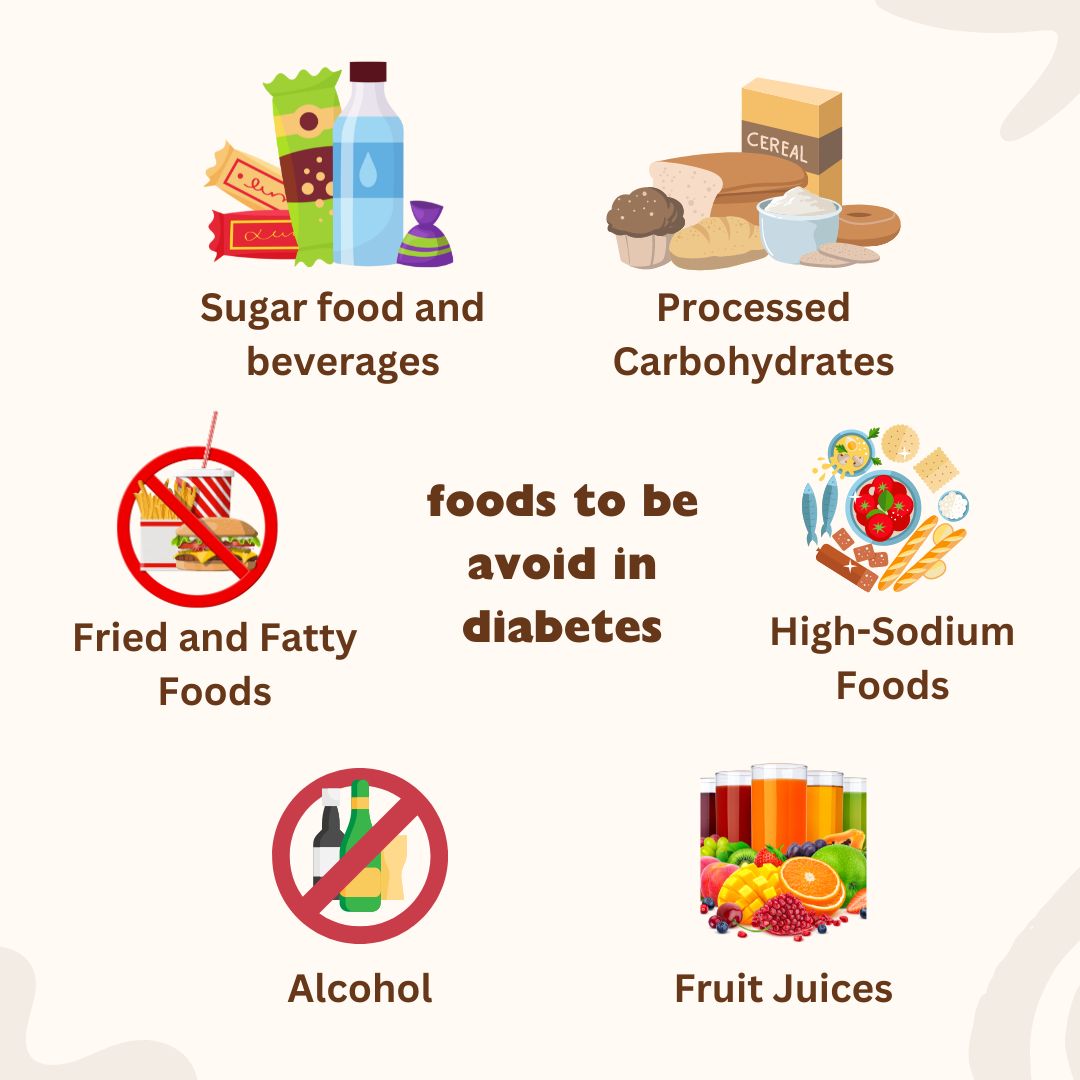
Creating a Balanced Diet Chart for Diabetic Patients
Table of Contents
Diabetes is a condition where your body has trouble controlling sugar levels in your blood. There are two main types: Type 1 and Type 2. In Type 1, your body doesn’t make insulin, a hormone that helps sugar enter your cells. Type 2 diabetes happens when your body doesn’t use insulin properly. Both types can lead to high blood sugar levels, which can cause serious health problems like heart disease, kidney damage, and nerve damage. People with diabetes need to manage their blood sugar levels through medication, diet, exercise, and sometimes insulin injections to stay healthy. Hence, here we are to discuss diet chart for diabetic patient.
Managing diabetes can be a challenging task, especially when it comes to maintaining a healthy diet. For individuals with diabetes, following a proper diet chart is crucial in controlling blood sugar levels and preventing complications. This blog will discuss the importance of a well-balanced diet chart for diabetic patient and provide a comprehensive diet chart to help you make informed choices about your food intake. From understanding the basics of carbohydrate counting to incorporating nutrient-rich foods into your meals, we will cover all aspects of creating a healthy eating plan tailored to your needs. Whether you are newly diagnosed with diabetes or looking to improve your current diet, this blog will serve as a valuable resource to help you navigate the world of diabetes management through proper nutrition.
Before proceeding with this topic, it’s essential to understand what a diabetic patient should avoid.
For more details about Diet Chart for Diabetic Patient contact us.
Foods to avoid in Diabetes Diet Chart

Sugary Foods and Beverages: Avoid sugary drinks like soda, fruit juices, and sweetened teas or coffees. Also, limit the consumption of candies, cakes, and pastries.
Processed Carbohydrates: Foods high in refined carbohydrates, like white bread, white rice, and pasta, can cause blood sugar spikes. Opt for whole grains instead.
Fried and Fatty Foods: Fried foods and those high in unhealthy fats can contribute to weight gain and insulin resistance. Limit foods like fried chicken, French fries, and fatty cuts of meat.
High-Sodium Foods: Excessive sodium intake can raise blood pressure, which can increase the risk of heart disease and stroke. Avoid processed foods, canned soups, and salty snacks.
Alcohol: Drinking alcohol can affect blood sugar levels and interfere with diabetes medication. If you choose to drink, do so in moderation and always with food.
Fruit Juices: Healthy fruits can contain much sugar without the fibre to slow down absorption. Opt for whole fruits instead.
Sweetened Yogurts and Desserts: Many flavoured yoghurts and desserts contain added sugars, so choose plain yoghurt and add fresh fruit for sweetness.
Excessive Portions: Eating large portions, even of healthy foods, can raise blood sugar levels. Pay attention to portion sizes and aim for balanced meals.
By avoiding these items and maintaining a healthy lifestyle, you can better manage your diabetes and reduce the risk of complications. Always consult with a healthcare professional for personalized advice and guidance.
Foods to Eat in Diabetes Diet Chart
Oats: Oats are a nutritious whole grain, rich in fiber and protein, offering numerous health benefits such as improved digestion and heart health.

Broccoli: Broccoli is a nutrient-dense vegetable, high in vitamins C and K, fiber, and antioxidants, promoting overall health and disease prevention.

Blueberries: Blueberries are antioxidant-rich fruits, high in vitamins C and K, fiber, and beneficial for brain health, heart health, and inflammation reduction.

Walnuts: Walnuts are nutrient-dense nuts, rich in omega-3 fatty acids, antioxidants, and minerals, supporting heart health, brain function, and overall well-being.

Quinoa: Quinoa is a protein-rich grain, packed with fiber, vitamins, and minerals, offering a complete protein source and promoting overall health.
Legumes: Legumes are nutritious plant foods, rich in protein, fiber, vitamins, and minerals, beneficial for heart health, weight management, and digestion.
7 Days Indian diet chart for diabetic patient
| Days | Breakfast | Mid-morning snack | Lunch | Evening snack | Dinner |
| Monday | Idli and sambhar + a bowl low fat yoghurt | A handful of walnut or almonds | 1 bowl brown rice + 1 bowl mixed vegetable curry sided with mixed salad. | A cup of green tea or herbal tea | 2 whole wheat roti with chicken curry sided with sauteed vegetables. |
| Tuesday | Vegetable poha served with a cup of buttermilk. | 1 apple or orange. | Mixed veg pulao made with brown rice with cucumber raita. | A handful of roasted chana or makhana with green tea. | Grilled fish curry with 2 whole wheat roti. |
| Wednesday | Moong Dal Chilla with mint and pudina chutney | A glass of tender coconut water. | Rajma chawal made with brown rice sided with cucumber and tomato salad. | A handful of roasted peanuts + green tea or herbal tea. | Chana Dal tadka with 2 whole wheat roti sided with sauteed vegetable. |
| Thursday | Oatmeal cooked with low fat milk topped with almonds and berries. | A small guava or a bowl of papaya. | 2 jowar roti with mixed vegetables sided with salad. | A bowl of sprouts + green tea or herbal tea. | Egg curry with 2 whole wheat roti sided with mixed vegetable raita. |
| Friday | Besan Chilla with mint or pudina chutney | A small banana or handful of mixed nuts. | 2 whole wheat roti with chana masala sided with cucumber raita. | Handful of popcorn + green tea or herbal tea. | Low fat palak paneer with 2 whole wheat roti sided with sauteed veggies. |
| Saturday | Methi paratha cooked in 1 spoon of ghee with mixed vegetable raita. | A glass of tender coconut water. | 1 bowl brown rice with Dal tadka sided with mixed vegetable salad. | A handful of roasted chana + green tea or herbal tea. | 2 whole wheat roti with mixed vegetable curry sided with small amount of grilled chicken. |
| Sunday | A bowl of semolina upma loaded with vegetables. | A bowl of mixed fruit like, papaya, oranges, apple and watermelon. | 1 bowl kadhi chawal cooked with brown rice sided with cucumber and onion raita. | A cup of green tea or herbal tea. | 2 whole wheat roti with bhindi masala sided with mixed vegetable raita. |
DT tailors this diet chart. RUKHSANA AZHAR, founder of Diet4u wellness, includes a variety of nutritious foods that are low in refined carbohydrates and sugars, high in fibre, and rich in essential nutrients. Diabetic patients must monitor their blood sugar levels regularly and consult a healthcare professional or dietitian for personalized dietary recommendations.
Key DOs and DON’Ts for Managing Diabetes with a Diet Chart
Dos:
Eat Regular Meals: Stick to a regular eating schedule with balanced meals and snacks throughout the day to help regulate blood sugar levels.
Choose High-Fiber Foods: Opt for whole grains, fruits, vegetables, and legumes, which are rich in fibre and can help stabilize blood sugar levels.
Stay Hydrated: Drink plenty of water throughout the day to stay hydrated, which can help prevent dehydration and support overall health.
Portion Control: Pay attention to portion sizes to avoid overeating, which can spike blood sugar levels.
Physical Activity: Incorporate regular exercise into your routine, such as walking, swimming, or cycling, to help manage weight and improve insulin sensitivity.
Monitor Blood Sugar Levels: Check your blood sugar levels regularly as your healthcare provider advises you to track your progress and make necessary adjustments to your treatment plan. Take your prescribed medications as directed by your healthcare provider to help control blood sugar levels effectively.
Don’ts:
Avoid Sugary Foods and Beverages: Limit your intake of sugary foods and drinks like soda, candy, and desserts, as they can cause blood sugar spikes.
Limit Refined Carbohydrates: Reduce consumption of processed and refined carbohydrates like white bread, white rice, and sugary cereals, which can raise blood sugar levels quickly.
Minimize Alcohol Intake: Limit alcohol consumption, as it can affect blood sugar levels and interfere with diabetes medications.
Avoid Fried and Fatty Foods: Avoid fried foods and dishes high in unhealthy fats, as they can contribute to weight gain and insulin resistance.
Don’t Skip Meals: Stick to your meal schedule and avoid skipping meals, as this can lead to fluctuations in blood sugar levels.
Reduce Sodium Intake: Reduce high-sodium foods like processed meats, canned soups, and salty snacks, as they can increase the risk of heart disease and worsen blood pressure control.
Avoid Stress: Manage stress through relaxation techniques like deep breathing, meditation, or yoga, as stress can affect blood sugar levels and overall health.
Following these dos and don’ts can help diabetic patients better manage their condition and reduce the risk of complications. Always consult with a healthcare professional like DT. RUKHSANA AZHAR, founder of Diet4u Wellness, for personalized advice and guidance tailored to your individual needs.
FAQs Regarding Diet Chart for Diabetic Patient
Q: Can I eat fruit if I have diabetes?
A: Yes, fruits are part of a healthy diet chart for diabetic patient. However, it’s important to monitor portion sizes and choose fruits lower in sugar, such as berries, apples, and citrus.
Q: Is it okay to eat carbohydrates if I have diabetes?
A: Yes, carbohydrates are an essential part of a balanced diet, but it’s important to choose complex carbohydrates like whole grains, vegetables, and legumes over refined carbohydrates. Monitoring portion sizes and spreading carbohydrate intake throughout the day can help manage blood sugar levels.
Q: How much protein should I include in my diet?
A: Including lean protein sources such as poultry, fish, tofu, and legumes in each meal can help stabilize blood sugar levels and promote satiety. Aim for moderate protein with each meal, about 15-30 grams per serving.
Q: Are there specific foods I should avoid altogether?
A: While no specific foods need to be avoided entirely, it’s essential to limit your intake of sugary foods and beverages, refined carbohydrates, fried and fatty foods, and high-sodium foods. Moderation and portion control are necessary.

Hello My Name is Dt. Ruksana Azhar and I am a certified dietician and providing online & offline services for Weight Management, PCOS/PCOD Management, Diabetes Management , etc. I have 12+ years of experience in the Apollo Hospital Delhi , Max Super Specialty Hospital Delhi, Lilavati Hospital Mumbai and VLCC healthcare Mumbai. I loves to write healthcare and lifestyle related blog. My favorite part of being a doctor is the opportunity to directly improve the health and wellbeing of my patients and to develop professional and personal relationships with them.



